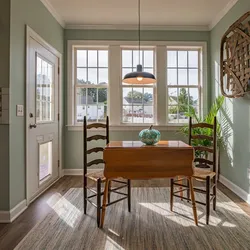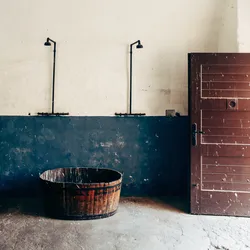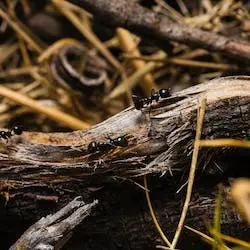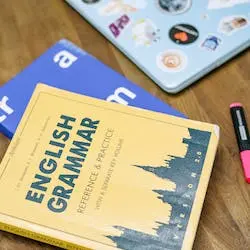
Level 1:
Mickey Mantle was a great baseball player a long time ago. He lived in a small house in Oklahoma. Now, people can buy a small part of his house. A company named Rally is selling these parts for $7 each. The house can become like a small museum for Mickey Mantle. People in the town where the house is get parts for free. The people who buy a part can help decide what happens to the house.
Highlighted vocabulary words:
Buy: To get something by giving money for it.
Level 2:
Mickey Mantle was a famous baseball player who lived in a small house in Oklahoma. Today, a company called Rally is selling pieces of his house to the public. Each small piece costs only $7. Rally hopes to turn the house into a museum to remember Mickey Mantle’s life and career. Also, the people who live in the town where the house is located will get pieces for free. These people, along with others who buy a piece, can help decide what will happen with the house in the future.
Highlighted vocabulary words:
Public: All the people in a country or area.
Piece: A part of something.
Career: The job or series of jobs that you do during your life, especially if you continue to get better jobs and earn more money.
Decide: To choose something after thinking about it.
Future: The time that will come after the present or the events that will happen then.
Full Story:
Have you ever wanted to own a piece of baseball history, specifically a piece of a legend’s childhood home? Well, now it’s possible, and what’s more, the cost is less than a meal at a trendy restaurant. Mickey Mantle’s childhood home is hitting the real estate market in a very unique way: through fractional ownership. Not sure what that concept means? Let’s dive in and explore this innovative investment opportunity.
Mickey Mantle, one of the all-time baseball greats and a mainstay in the New York Yankees, lived in a quaint two-bedroom bungalow in Commerce, Oklahoma during his formative years. This is where he learned to bat, under the guidance of his father and grandfather. It’s said that any ball he managed to hit over the house roof was considered a home run!
Keeping the home nearly identical to the way it had been when Mantle practiced his famous swing, the property is now being offered to the public for investment. Collectibles investment company, Rally, is using this occasion to introduce their fractional ownership model within real estate.
But what exactly is fractional ownership? Well, let’s paint a picture. Imagine owning a slice of an expensive painting by Vincent Van Gogh. Due to its value, hardly anyone can afford to buy the entire painting, but through fractional ownership, anyone can invest in a ‘piece’ of it. This concept of investment applies here. Rally is selling shares of Mantle’s childhood home for a mere $7 a share, with a total of 47,000 shares up for grabs. With fractional ownership, the investor doesn’t own the asset in a traditional sense but owns a ‘fraction’ or ‘share’ that represents part ownership.
Rally purchased Mantle’s bungalow last year and valued it at $329,000, nearly double what they had initially paid. They have also spent approximately $50,000 on refurbishments and intend to keep a stake, somewhere between 1% and 5% in the property.
By offering such an opportunity, Rally is not just hoping to provide an innovative investment experience, but they also plan to cement Mantle’s legacy. The company has expressed intentions to transform the bungalow into a museum, thus preserving it as a prominent part of baseball history.
In a bid to include local residents from the city of Commerce in this endeavor, Rally plans to offer free shares to its 2,500 residents. Many of these residents have personal connections to Mantle, who passed away in 1995, and their inclusivity in the project is poised to reflect the town’s pride in their local sporting legend.
As an investor, besides monetary gains, there are some unique benefits to fractional ownership. Shareholders in the home will have the power to vote on its future. This shared decision-making process will be facilitated through proposed town hall meetings, emphasizing the collective custody and care of the property.
This unique offering indeed presents a remarkable opportunity to own shares in a valuable sports memorabilia item and a tangible piece of baseball history. However, like any other investment, it is essential to note that buying shares in such a distinctive item is rarely lucrative. But the chance to share a piece of history? That’s an opportunity to knock out of the park!
Highlighted vocabulary words:
- Mickey Mantle: A former professional American baseball player who is known as one of the greatest players in the history of the sport. He played his entire 18-year major league career for the New York Yankees.
- New York Yankees: An American professional baseball team based in the New York City borough of the Bronx.
- Offered to the public: In the context of investments, when an opportunity is made available to the general public.
- Fractional ownership: A method in which several unrelated parties can share ownership, reducing the price for each participant.
- Monetary gains: An increase in monetary value due to investments or appreciation of assets.
Questions:
Question: Who was Mickey Mantle and what was his significance in baseball?
Answer: Mickey Mantle was a professional American baseball player known for his exceptional skills and contributions to the sport. He made a significant impact on baseball history during his 18-year career with the New York Yankees.Question: Can you explain the concept of fractional ownership and how it is being applied to Mickey Mantle’s childhood home?
Answer: Fractional ownership is a method where different people can share and own a piece of something valuable. In the context of Mickey Mantle’s childhood home, the company Rally is selling shares of the home, thus allowing many people to own a small part of this significant piece of baseball history.Question (Opinion): What do you think about the idea of using fractional ownership as a way to preserve historical properties?
Answer: Personally, I find the concept of fractional ownership to be an innovative way to preserve historical properties. It allows a wider range of individuals to take part in owning and preserving a piece of history, creating a broader sense of communal responsibility.Question (Opinion): How do you feel about the decision to offer shares to local residents for free?
Answer: I believe offering shares to local residents for free is a thoughtful decision. It instills a sense of pride and ownership among the locals for being a part of a legend’s history. It could also serve as a wonderful way to remember and maintain their connection with Mantle.
Fill in the Blanks:
- Mickey Mantle was a professional baseball player who played for the ________ team.
- The childhood home of Mickey Mantle is being ________ to the ________ for an investment.
- The company Rally is using a method called ________ ________ to sell parts of the house.
- People buy shares in Mickey Mantle’s house looking forward to ________ ________.
- People who buy a share of Mantle’s house can ________ on its future.
Random order of words:
monetary gains, New York Yankees, decide, fractional ownership, offered to the public.
Mini Comprehension Test on “Owning a Share of Mickey Mantle’s Home”
Question 1: Who was Mickey Mantle?
- a) A baseball player
- b) A football player
- c) An investment company owner
- d) A town mayor
Question 2: What is the name of the company offering shares of Mantle’s home?
- a) Commerce Home Shares
- b) Mantle House
- c) Rally
- d) Fractional Ownership Co.
Question 3: What is the price of each share of Mantle’s home?
- a) $70
- b) $700
- c) $17
- d) $7
Question 4: In what state is Mantle’s childhood home located?
- a) Kansas
- b) California
- c) Oklahoma
- d) New York
Question 5 (True/False): Rally plans to offer free shares to residents of Commerce, Oklahoma.
- a) True
- b) False
Question 6 (True/False): Rally plans to turn Mantle’s childhood home into a museum.
- a) True
- b) False
Question 7 (SEO-based): Which phrase represents part ownership in a high-value product or property?
- a) Shared accommodation
- b) Fractional ownership
- c) Partial ownership
- d) Shared ownership
Question 8: According to the article, is investing in fractional ownership like Mantle’s house expected to be highly profitable?
- a) Yes
- b) No
Question 9 (Opinion): Do you think the idea of fractional ownership is a good way to preserve historical properties? Why or why not?
Question 10 (Opinion): How might owning a share of Mantle’s childhood home be valuable beyond potential monetary gain?
Answer Key
1-a, 2-c, 3-d, 4-c, 5-a, 6-a, 7-b, 8-b, 9- (Personal response), 10- (Personal response).




